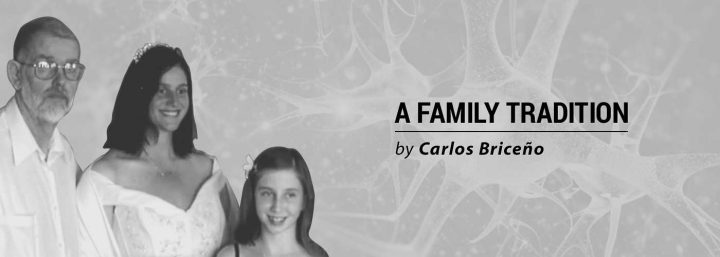Respecting Religious Beliefs Can Offer Peace in Families

What makes a great marriage? That age-old question has been the subject of many books over the years, hundreds of talk shows, and millions of arguments. Money, especially fighting about how much to spend, is always a big topic. Many think that if you are an active listener, your marriage will last a lifetime. Others even suggest that disliking the same thing will make your marriage strong.
Those are all really great ideas, but tonight I realized that, for my marriage, it is as simple as respecting each other’s beliefs and being able to discuss them in a logical manner without judging the other. Caregiving becomes much easier if that foundational respect is present.
In the past, I have alluded to my Christian beliefs, and how my faith in God has helped me through the difficult days in my life. This is especially true since Jill and our daughter, Alexus, have tested gene-positive for Huntington’s over the last two years. I go to Mass every weekend, and I volunteer to help in many of the church’s activities.
Jill was raised in a Christian home by parents who were actively involved in church, so she understands the concept of church but has had issues with the way she has been treated by some people who attended her church in Florida. She was hurt by people she felt should have been kind to her because that’s the whole point of church — to have a community that supports one another and loves God.
Those experiences made her weary of the church, their leaders, and the congregation, all of which I completely understand. Her decision not to continue to be a part of “organized religion” is a choice that saddens me, but one I respect.
Caregivers need to figure out what gives them strength in healthy ways. For some, it means relying on a group of friends or family or taking time to go running. My strength and sense of peace come from my faith and my relationship with God. And I’m lucky that Jill respects all that.
I have talked to many families over the years who have the same dynamic: one person is active with his faith and the other is not. I have noticed in talking to them that this often leads to tension in their marriages and divides them in a spiritual way. People who have strong faith tend to want to share it, especially with the ones they love.
I feel strongly about my faith in a way that lets me talk about it openly. I am not embarrassed by what I believe, even though it isn’t always popular to talk about it. Because I am active in my church, Jill and I have had many conversations about my beliefs and the fact that she disagrees with quite a few of them.
Conversations like that aren’t always respectful. Talking about religion can cause people to devolve into delivering vicious attacks, calling others “stupid.” Not in our house. Jill listens patiently, acknowledges that she understands what I believe, and gives me her opinion. We don’t always agree, but there is always respect.
When the discussion ends, we both feel like we have been heard and that the other will think about what was said. Hopefully one day we may meet a little more in the middle.
My hope in sharing all this is that, if there are religious differences in families who are affected by Huntington’s, those who have the disease and their caregivers may come to the realization that respect is more important than division. And that faith does not have to be a point of contention but can be seen as a source of love.
***
Note: Huntington’s Disease News is strictly a news and information website about the disease. It does not provide medical advice, diagnosis, or treatment. This content is not intended to be a substitute for professional medical advice, diagnosis, or treatment. Always seek the advice of your physician or other qualified health provider with any questions you may have regarding a medical condition. Never disregard professional medical advice or delay in seeking it because of something you have read on this website. The opinions expressed in this column are not those of Huntington’s Disease News or its parent company, Bionews Services, and are intended to spark discussion about issues pertaining to Huntington’s disease.







Leave a comment
Fill in the required fields to post. Your email address will not be published.